Integrative Cancer science. Global Impact. Individualized Patient Care.
As the most comprehensive and critically important cancer meeting in the world, the AACR Annual Meeting brings together all of the key stakeholders in cancer research. In 2019, more than 21,000 laboratory scientists, clinicians, other health care professionals, survivors, patients, and advocates from 71 countries came to Atlanta from around the world to make connections, build collaborations, and explore and expand the frontiers of integrative cancer science.
EXPANDED EDUCATIONAL PROGRAM
A comprehensive education and training program has long been a hallmark of the AACR Annual Meeting. Led by chair Jennifer A. Wargo, MD, the 2019 Annual Meeting Education Committee developed a robust slate of more than 60 Educational Sessions and Methods Workshops addressing vital topics such as clinical trial design; tumor immunology and immunotherapy for nonimmunologists; systems biology approaches to cancer; and co-evolution of tumor and microenvironment in cancer metastasis. For the first time, the Annual Meeting was expanded to a sixth day to accommodate these vital sessions.
INSPIRING PLENARY SESSIONS
Following the two-day educational program, each of the four days of the Annual Meeting's main scientific program featured a plenary session to inform and inspire the attendees—beginning with the Opening Plenary Session titled "Achieving Equitable Patient Care through Precision and Convergent Cancer Science." Moderated by 2019 Annual Meeting Program Committee chair John D. Carpten, PhD, the session addressed a range of topics, including the use of wearable technology for clinical assessment, precision oncology, and next-generation CAR T cells. Additional plenary sessions addressed compelling topics such as "Clinical and Translational Research in Diverse Populations," "Manipulating the Immune System in Cancer Therapy," and "Pathogen-Related Cancers: Implications for Populations and Public Health."
Presidential Select Symposium: Engaging Cancer Patients as Partners in the Research Process
Another development with paradigm-changing potential is the incorporation of patients into the cancer research process. Engaging the vital perspectives of cancer patients in the drug development and clinical care enterprise has been shown to accelerate the release of new treatments as well as their adoption by the health care community. Recognizing the power of patient voices, AACR President (2018–2019) Elizabeth M. Jaffee, MD, FAACR (right), featured the topic in her Presidential Select Symposium at the Annual Meeting. A distinguished panel of representatives from the drug development, regulatory, funding, and patient communities discussed effective strategies for making patients into research partners.
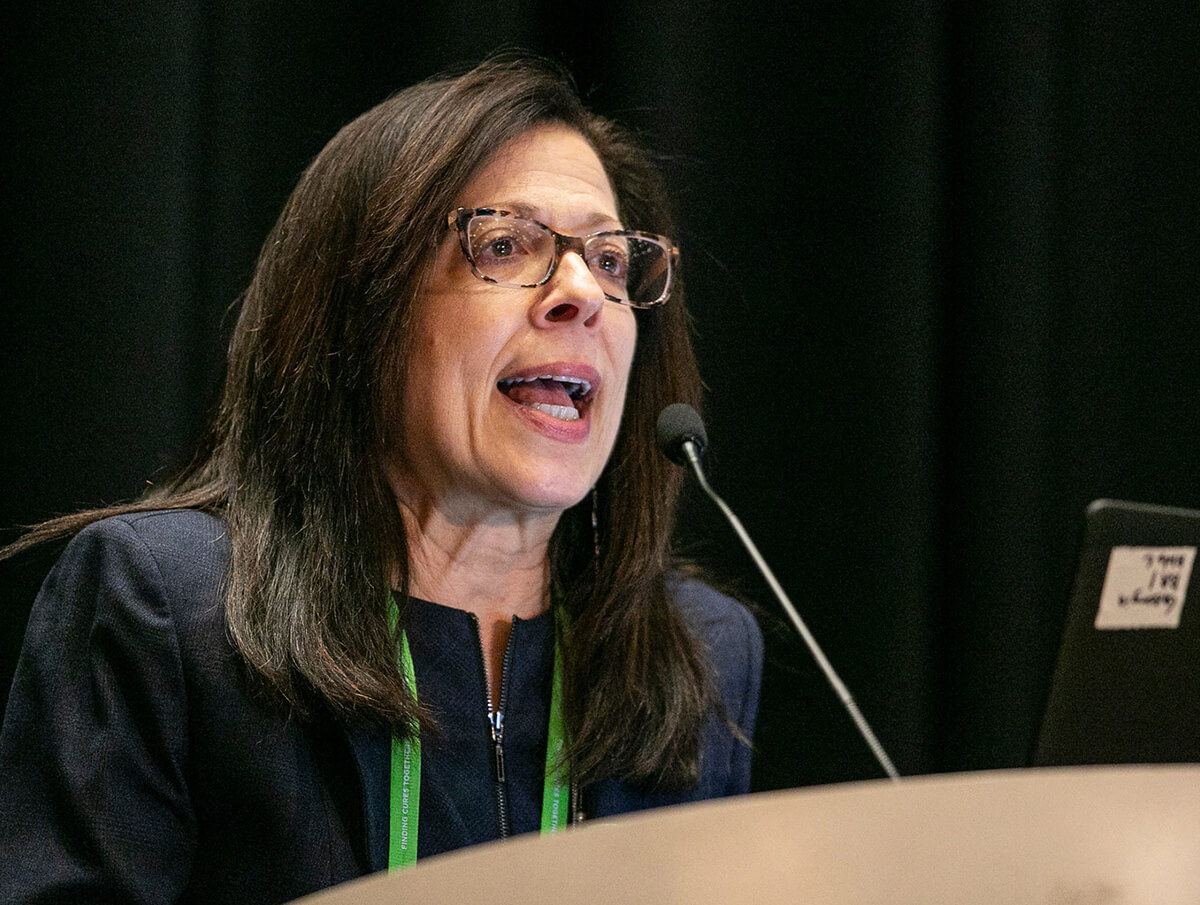
Honoring Paradigm-Shifting Discoveries
During the opening ceremony of the Annual Meeting, AACR CEO Margaret Foti, PhD, MD (hc), recognized AACR member James Allison, PhD, FAACR, for receiving the 2018 Nobel Prize in Physiology or Medicine. Dr. Allison received the prize with his colleague, Tasuku Honjo, MD, PhD, FAACR, for their discovery of cancer therapy by inhibition of negative immune regulation.
A FORUM FOR NCI LEADERSHIP
Befitting the status of the AACR Annual Meeting as the touchstone event of the cancer research community, the opening ceremony of the meeting also featured a joint address by the leaders of the NCI. Noting the adage that “we drink from wells we did not dig, [and] we are warmed by fires we did not build,” NCI Director Norman “Ned” Sharpless, MD, FAACR, and Deputy Director Douglas R. Lowy, MD, FAACR, reminded the attendees that the tremendous advances they have made against cancer are built upon the contributions of generations of scientists, physicians, and patients that came before them—a debt they must repay by driving continued progress for the generations that follow.
As cancer researchers, our knowledge is built on breakthroughs that were shared with us by people we will never meet. Like other researchers, and physicians, and—I would argue, most importantly—patients. It's very humbling to consider the millions of patients with cancer who have participated in clinical trials over the years, many of whom participated with the full knowledge that…the advances would be made after their lifetimes. In their worst days, they built a fire for others to warm their hands. And our progress is their legacy. It's our charge to continue this progress for those who come after us.”
— Norman “Ned” Sharpless, MD, FAACR
NCI Director
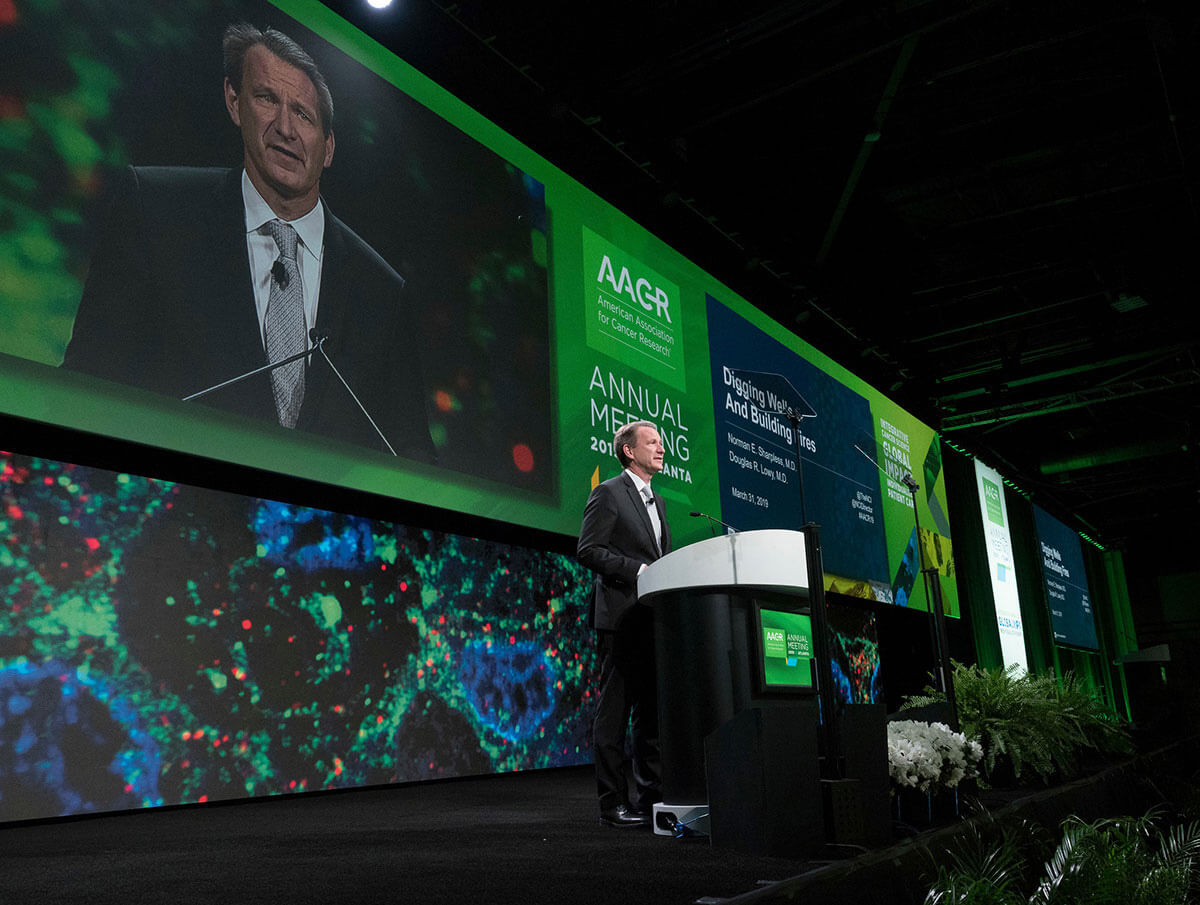
The progress we are seeing is tremendous. But we still have much to do. Cancer research is an amazing enterprise, with each of us making our distinct contributions to something that is much bigger than each of us. Another way of thinking about it is that when what we do goes well, the whole is always greater than the sum of its parts. The AACR meeting is a great opportunity to learn new things, and to make new connections as we build on previous discoveries. It can also be an opportunity for each of us to chart or refine the course by which we plan to continue to the progress that we know must lie ahead.”
— Douglas R. Lowy, MD, FAACR
NCI Deputy Director
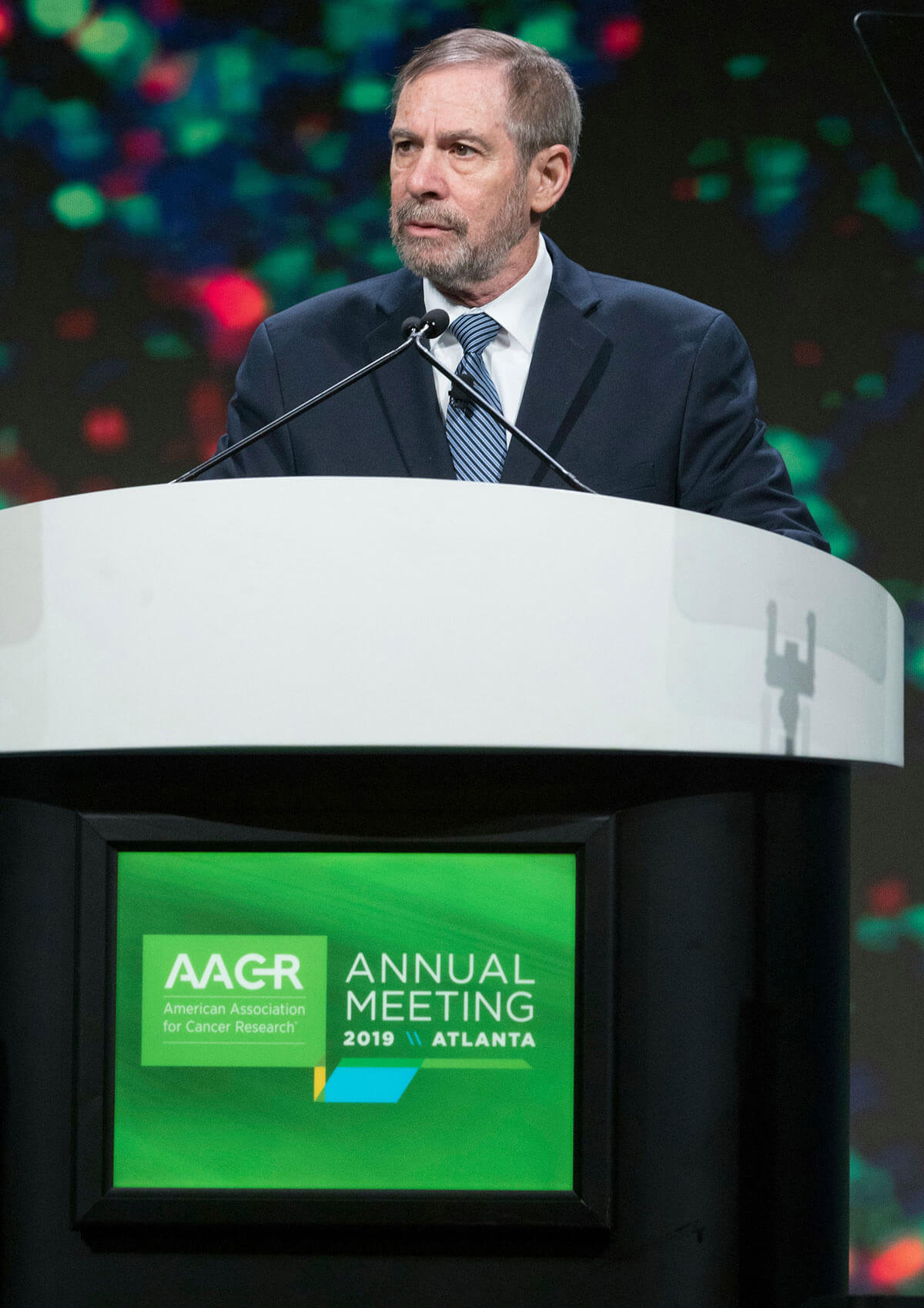
AACR Annual Meeting 2019: Innovative Cancer Science
The AACR Annual Meeting 2019 provided a global showcase of the greatest science from the best minds in all areas of cancer research and cancer-related science. Highlights from the multidisciplinary, high-impact program were summarized by AACR leaders in a wrap-up plenary session.
The first presenter, Marcia R. Cruz-Correa, MD, PhD, a member of the AACR Board of Directors, discussed key cancer prevention, interception, and early detection research reported at the meeting. Among the presentations she highlighted were two emphasizing the promise of immunoprevention. In the first presentation, a peptide vaccine was shown to reduce intestinal tumors and improve survival in a mouse model of Lynch syndrome. In the second presentation, a MUC1 vaccine was shown to elicit immune memory in patients recently diagnosed with advanced colorectal adenomas, and it is hoped that this will prevent adenoma recurrence. Dr. Cruz-Correa also drew attention to a chemoprevention study in which the drug apalutamide (Erleada) provided protection against prostate cancer in rats and two clinical trials showing that different lifestyle modifications, increased physical exercise and reduced consumption of red and processed meat, decreased risk for obesity-related cancers and certain colorectal cancer precursors, respectively. Dr. Cruz-Correa concluded by discussing early data from two liquid biopsy studies, one suggesting that circulating tumor cell analysis could aid in the early detection of lung cancers, and another suggesting that serum biomarkers could help detect early-stage ovarian cancer.
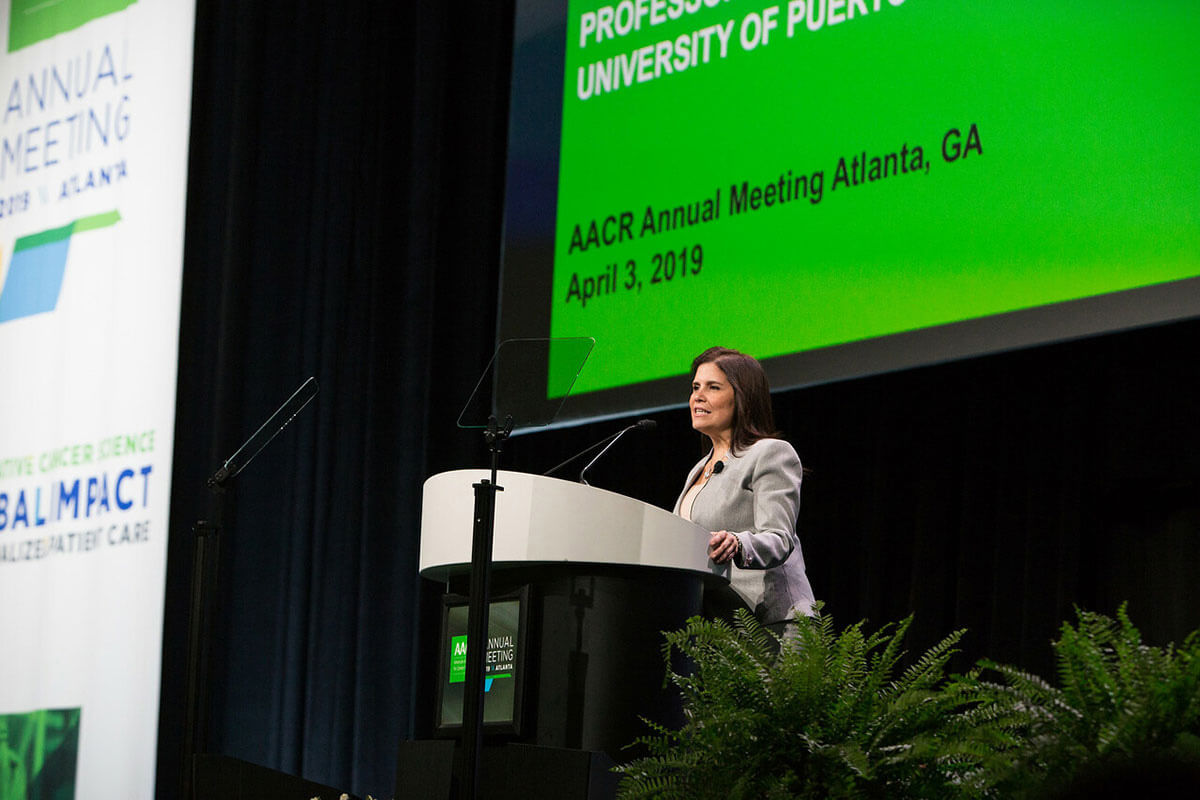
John D. Carpten, PhD, chair of the 2019 Annual Meeting Program Committee, highlighted key sessions at the meeting during which investigators presented groundbreaking basic cancer science and translational research. He began by discussing the opening plenary session titled, “Achieving Equitable Patient Care through Precision and Convergent Cancer Science,” as well as the plenary session titled, “Clinical and Translational Research in Diverse Populations,” which put a spotlight on advances in our understanding of cancer in different populations around the world. Dr. Carpten then explained that innovative research presented at the meeting showed that single-cell technologies can be paired with imaging to allow spatial genomic analysis of single cells in a tumor and that this has the potential to further understanding of the role of cell–cell interactions in tumor evolution. Among the other sessions showcased by Dr. Carpten were those detailing advances in understanding the mechanisms of drug resistance, including resistance to immunotherapy caused by T-cell exhaustion; those focused on using structural and functional genomics to deepen our knowledge of cancer biology; and those featuring progress in the utilization of cutting-edge technologies to analyze circulating biomarkers. Dr. Carpten concluded his remarks by noting that the basic cancer science and translational research presented at the meeting will drive future progress in patient care.
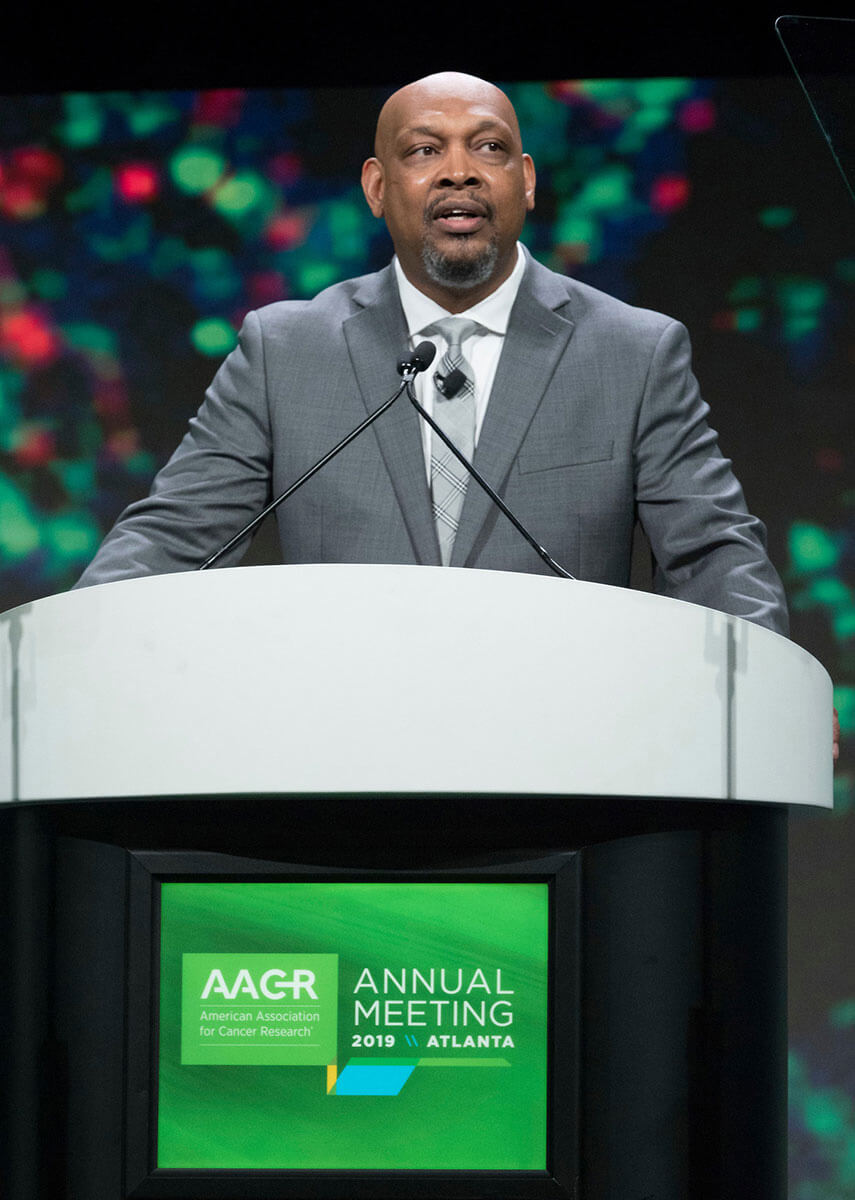
Patricia M. LoRusso, MD, highlighted some of the groundbreaking clinical trial data presented at the meeting. For the first part of her presentation, she focused on clinical trials with novel designs, including three trials designed to test the feasibility of bringing novel agents into earlier lines of treatment, two trials evaluating therapeutics in preselected patient populations, and clinical trials with integration of biomarkers. Dr. LoRusso then touched upon trials featuring novel delivery mechanisms, including a clinical trial testing fecal microbiota transplantation as a way to restore responsiveness of melanoma patients to immune checkpoint inhibitors, and trials of new therapeutics. The final clinical trial highlighted by LoRusso was the phase III ADMIRAL trial. Dr. LoRusso noted that results from this trial, which showed that the FLT3-targeted therapeutic gilteritinib (Xospata) improved survival for patients with relapsed or refractory acute myeloid leukemia harboring a FLT3 mutation compared with standard chemotherapy regimens, were practice changing and are establishing a new treatment paradigm for acute myeloid leukemia.
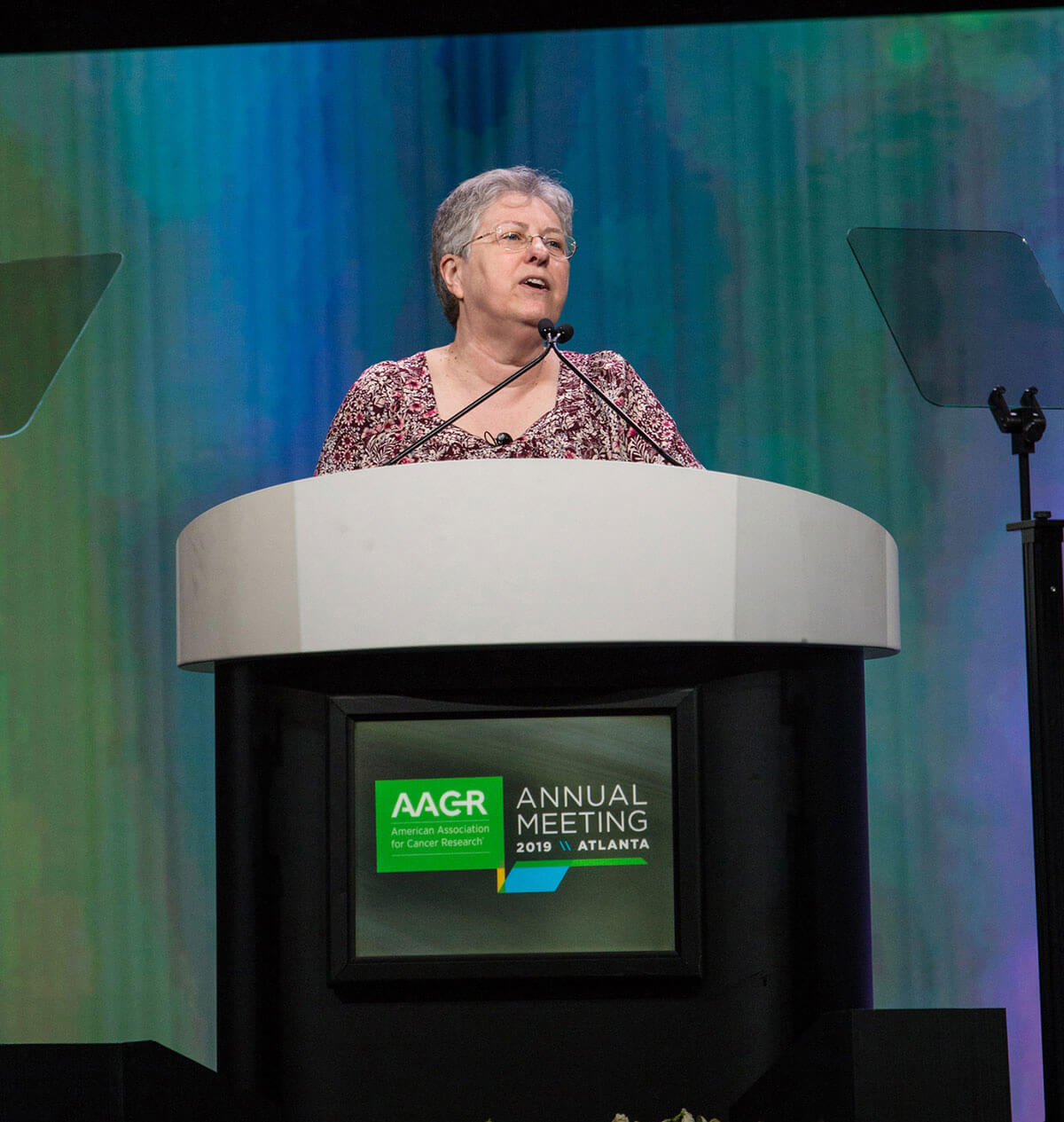
AACR Annual Meeting 2019: Media Coverage
The AACR Annual Meeting 2019 generated global interest, as the innovative cancer science presented in Atlanta produced a significant amount of news coverage and social media activity.
35
News releases were distributed.
190
Reporters registered to cover the meeting.
3,500+
Media mentions were generated.
25,197
Tweets mentioned the #aacr19 hashtag.
6,759
Unique users joined the Annual Meeting conversation on Twitter.
800
Number of followers for the @AACR_CEO Twitter account. The AACR launched the social media account featuring AACR Chief Executive Officer Margaret Foti, PhD, MD (hc), during the Annual Meeting. The account offers followers a perspective on the wide range of activities in which Dr. Foti engages to advance the mission of the AACR.